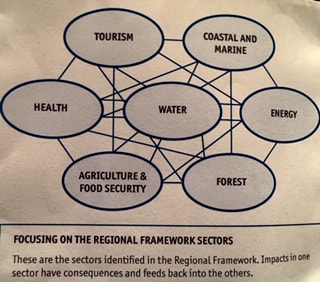|
9/11/2019 Reflections on Climate Resilience in the Caribbean and indications for innovative ApproachesRead Now The Bahamas tragedy following the devastating effects of Hurricane Dorian has brought into stark reality the unrelenting havoc that natural disasters have reeked on the Caribbean Region in recent years. The Special Report on Climate Change and Land ( SRCCL) from a meeting of the Intergovernmental Panel on Climate Change (IPCC) comprising leading international experts held in Geneva, July 2019, is very informative https://www.ipcc.ch/report/srccl/.reemphasizes. It identifies the major reasons for the devastating impact that global warming is having on the Caribbean. Among them are coastal erosion resulting from sea level rise and tropical hurricanes, which greatly threatens lives and livelihoods in the region and degradation of ecosystems, both marine and land. They both harm industries on which we rely, such as fishing and farming, not to mention tourism. Overall, the Caribbean is particularly vulnerable to greater health, environmental and economic challenges because of these climate and land changes. Before actually venturing to establish innovative approaches to climate action in the Caribbean, there is need to identify important building blocks. The Special Report on Climate Change and Land, the second of three Reports from the IPCC is based on scientific studies and empirical outcomes. The First, Global Warming of 1.5° C was issued in September 2018. The third is on Ocean and Cryosphere in a changing Climate, which is expected to be released later this month. Of importance to the Caribbean is the active engagement of UWI academics among others in the work of this high level international Panel. In addition, at the UN High-Level Political Forum 2019 (HLPF) on Sustainable Development, where UWI co-hosted a symposium, Research and Innovation 4 Climate Action, which showcased research initiatives of members of the Global University Consortium on SDG #13 and highlighted the synergies between SDGs #4, #13 and #17. Also, in July 2019, UWI hosted the first-ever meeting of Universities across the Commonwealth to collaborate on climate challenges and resilience in their countries involving representatives from approximately 500 institutions in 50 countries. UWI's efforts to aid in developing a culture of resilience and planning in the Caribbean are adequately reflected in its Triple A Strategy (Strategic Plan 2017–2022). Major Illustrations of Functional Cooperation in Migration and Adaptation provide lessons for Resilience These more recent contributions to the Climate Change debate are built on the foundations of earlier regional initiatives. Chief among these is the landmark Global Small Island Developing States (SIDS) Conference held in Barbados in 1994. It resolved to give priority treatment to the issue of climate change based on its potential to severely disrupt the development efforts of Small Island Development States (SIDS) and the low lying coastal states. It included the Caribbean Planning for Adaptation to Climate Change (CPACC) project, funded by the Global Environmental Facility (GEF); Adapting to Climate Change in the Caribbean (ACCC) project, funded by Canadian Climate Change Development Fund 2001-2003 and Mainstreaming Adaptation to Climate Change project also funded by GEF 2004-2007. These projects led to the establishment of a CARICOM wide network of monitoring stations; development of regional capacity for coral reef monitoring; vulnerability assessments; economic valuation of environmental services; the articulation of national climate change adaptation policies and implementation plans, and increased public awareness of climate change issues in the Region. Consolidating the Regional Response: The Caribbean Community Centre for Climate Change as a catalyst Notwithstanding the projects’ successes, it was clear that a more permanent strategy was needed to respond to the effects of Climate Change in the Caribbean. The vision and mission of the Caribbean Community Climate Change Centre (5Cs), together with those of complementary institutions and programmatic priorities have evolved as critical factors of a Climate Action Strategy Established in 2006 as a CARICOM Institution, the 5Cs under the leadership Dr Ken Leslie its CEO, provided the basis for a more coherent accelerated regional response. This is fully illustrated in the Caribbean Strategic Plan of Climate Change 2009-2021, formulated by the new leadership supported by the CARICOM Task Force for Climate Change in 2008. It identified a vision around the Three Ones Principle - One Coordinating Mechanism, One Consolidated Plan and One Monitoring and Evaluation Framework. Its mission based on 5 implementable pillars emerging from the 2009 Lilliandaal (Guyana) Declaration was approved by CARICOM Heads of Government in 2012. They include:
Complementary Institutional developments include:
Programmatic Priorities include:
Setting the Scene for innovations in Climate Action We have sketched some of the issues leading up to the accelerated approach to climate action in the Caribbean. In so doing, we drew upon some leading international activities involving Caribbean experts; the pursuit of functional cooperation in mitigation and adaptation, consolidating the regional response through CARICOM institutions such as 5Cs and CDEMA; engaging complementary institutions; and focusing on programmatic priorities. These are the prerequisites for effective innovations. Averting another climatic catastrophy such as those experienced in The Bahamas is another matter.
4 Comments
Eliot Sorel
9/12/2019 10:41:15 am
Thank you for this important update on islands and climate change inclusive of the PM of Barbados invaluable quotation.
Reply
George Alleyne
9/12/2019 11:50:58 am
Dear Eddie
Reply
11/5/2019 10:27:15 pm
Nice post. I learn something more challenging on different blogs everyday. It will always be stimulating to read content from other writers and practice a little something from their store. I?d prefer to use some with the content on my blog whether you don?t mind. Natually I?ll give you a link on your web blog. Thanks for sharing.
Reply
11/2/2020 10:33:45 pm
Keep up the good work , I read few posts on this web site and I conceive that your blog is very interesting and has sets of fantastic information
Reply
Leave a Reply. |
Details
AuthorEdward and Auriol Greene Directors, GOFAD. Archives
April 2022
Categories |
Global Frontier Site Links |
Contact InformationEmail: [email protected]
Twitter: @GofadGlobal |

 RSS Feed
RSS Feed
